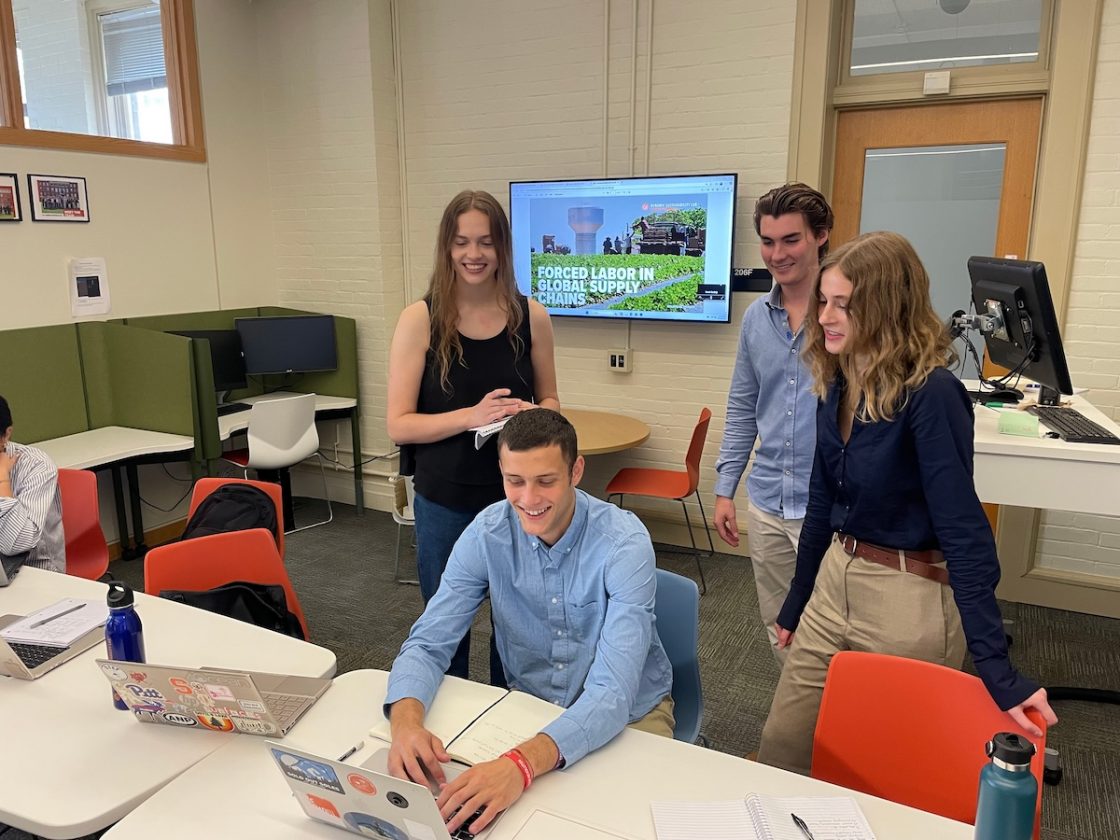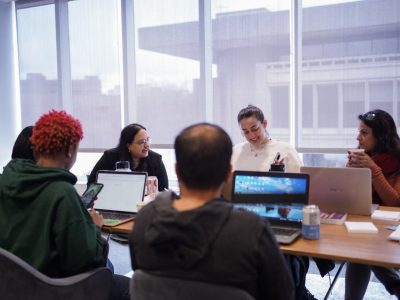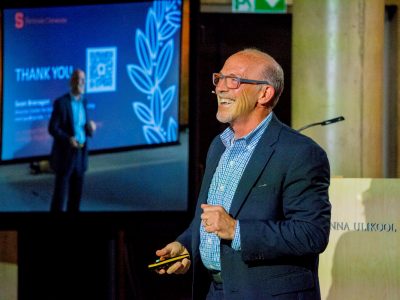
Dynamic Sustainability students studying forced labor include Dominick Miceli (seated), and from left, Kelsey McGraw, JP Ceryanek and Jennifer Sadler.
Dynamic Sustainability Lab Collaborates With Thomson Reuters to Build Expertise and Opportunity
Forced labor in global supply chains may decline in coming years as Generation Z—today’s teens and young adults—gain financial influence. Unlike previous generations, they are more willing to pay a premium for products manufactured ethically.
These and other findings are the result of a two-year study by the University’s Dynamic Sustainability Lab (DSL) on behalf of Thomson Reuters, a global content and technology company based in Canada.
In addition to revealing data that helps inform industry leaders, policymakers and the public, the collaboration provided valuable research and experiential learning opportunities to numerous University students engaged with the DSL.
It also laid the groundwork for a strategic collaboration that DSL Director Jay Golden says will complement the lab’s endeavors while giving students opportunities to interact with industry thought leaders and examine critical sustainability issues under the mentorship of Thomson Reuters experts.
“Given the impactful and positive experiences our students have had with the forced labor in global supply chain collaboration, we are thrilled to deepen our relationship with Thomson Reuters,” says Golden. “It provides student and faculty researchers within the Dynamic Sustainability Lab greater opportunity to tackle important real-world challenges in companies and governments around the world and come up with innovative, next-generation solutions, models and tools.”

Golden founded the Maxwell-based DSL in 2021 after he joined the school as the inaugural Pontarelli Professor of Environmental Sustainability and Finance. He describes the lab as a cross-disciplinary, nonpartisan think tank that examines the “opportunities, risks and unintended consequences” that arise from the adoption of new technologies, new strategies and growing dependence on foreign-sourced resources and supply chains used in energy, climate and sustainability transitions.
Students engaged with the DSL represent a wide range of programs including many Maxwell majors. They share their data findings in government reports and technical bulletins and at sustainability symposiums the DSL hosts annually in major cities like Boston, New York City and Washington, D.C.
A Student and National Thought Leader
The DSL’s connection with Thomson Reuters began with Maxwell graduate student Heather Panton G’26 when she enrolled in the executive master’s in international relations program in Washington, D.C. Today she is senior advisor for human rights crimes and social impact at Thomson Reuters.
In 2023, Panton was awarded an Eisenhower Fellowship to advance her study of forced labor—a form of human trafficking—in global supply chains. She traveled to Malaysia and Thailand to study best practices and drive public awareness to educate consumers about making ethical purchasing decisions. She received academic guidance from Golden and shared with him a growing interest in the potential impact of up-and-coming consumers.
“When I was abroad, so many people asked about demand from the next generation,” Panton says. “Historically, American baby boomers often prioritized price, without fully considering how cost-cutting would ripple through suppliers and vendors across the supply chain. That has put pressure on companies to reduce costs in ways that sometimes affect workers’ wages and living conditions abroad. We believe Gen Z will play a critical role in shifting that dynamic by asking tougher questions, such as, ‘Was this product made with slave labor?’”

Golden was excited for the opportunity to work with Panton. Her resume included roles with the McCain Institute, the U.S. Department of State, the U.S. Department of Justice and the White House. Among them: special advisor for human trafficking and the inaugural human trafficking czar during the first Trump administration.
“She was not only our student but also a thought leader in the country,” says Golden. “I’ve learned a lot—probably more than she’s learned from me.”
Golden brought Panton’s Eisenhower Fellowship research to the DSL, where students spent the next two years expanding her work, studying generational purchasing trends, gathering data and refining her findings.
“They’re such smart students—they’re right on the mark,” she says. “We’ve worked to expand the scope of what they’re thinking about. We want them to be focused and driven, thinking about exposing things that I don’t know that many people are talking about in the mainstream. We want them to be able to present in a way that’s not only academically rigorous but also digestible—something that industry or government can consume right away.”
Presenting Research to Global Industry Leaders
The students produced a technical bulletin by the DSL, and a related article has been posted on Thomson Reuters’ website. Both share that by 2030, Generation Z will represent 17% of retail spending in the U.S., and 81% of consumers in the age group have changed their purchasing decisions based on brand actions or reputation, with 53% participating in economic boycotts.
While pursuing a bachelor’s degree in policy studies, 2024 Maxwell alumnus Ka’ai I worked as a student researcher with the DSL. He gathered information about forced labor laws across the globe, collected related policies for multi-national corporations and assisted with surveys.
“We basically did a level-set in terms of ‘How do we understand where we are at now, where are we at in terms of forced labor, and how that is affecting the market?’” says I.
The experience was empowering and prepared him for his current work with Deloitte Consulting.
“As a young professional, I’m working on many of the same things I did with the Dynamic Sustainability Lab—data analysis, survey development, stakeholder engagement,” I says. “As I navigate the professional workspace, I feel much more confident and capable going in to a pretty competitive workforce.”
Another outcome of the DSL forced labor collaboration with Thomson Reuters: two events in the 2024-25 academic year at which data findings were presented and expanded upon by subject area experts. The symposia in Washington, D.C., and in Portland, Oregon, drew representatives from footwear and apparel companies as well as government officials.
“Our students helped push the notion, ‘We are your growing customer segment,’” says Golden. “The leadership from these companies that were in attendance really acknowledged that and were receptive. The work that started with Heather has expanded to where we have the attention of the global footwear and apparel industry. It’s a rare occasion that the type of research finds its way into the mainstream in consumer decisions and draws the attention of international governments and especially the top leadership of global companies.”
Panton says the collaboration with DSL is mutually beneficial.
“The academic rigor is unbeatable,” she says of the research and resulting data. “It’s a great combination of practitioner-meets-academic—we’re taking substantive work and making it very easy for anyone in a C-suite to look at it.”


